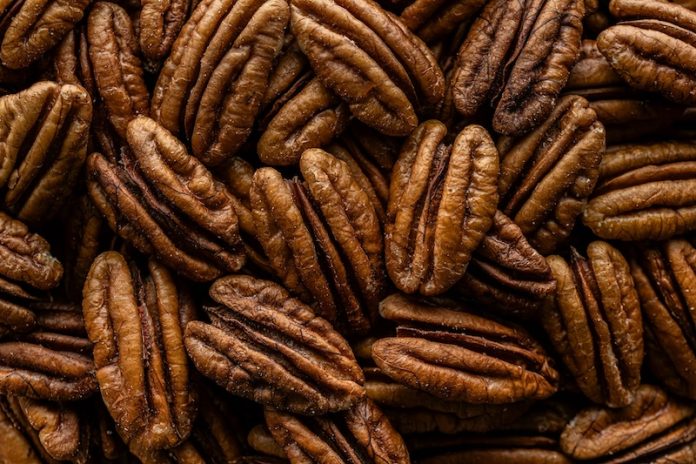
A handful of pecans a day could lead to healthier cholesterol levels and an overall better diet, according to new research from Penn State University. The study, published in The American Journal of Clinical Nutrition, found that replacing typical daily snacks with pecans helped adults with or at risk for metabolic syndrome lower their cholesterol and eat more healthfully overall.
Metabolic syndrome is a group of conditions—such as high blood pressure, abdominal obesity, high blood sugar, and abnormal cholesterol levels—that increase the risk of heart disease, diabetes, and stroke. Nearly 1 in 3 adults in the U.S. have at least some of these risk factors.
The study included 138 adults between the ages of 25 and 70 who had one or more markers of metabolic syndrome. Participants were randomly assigned to one of two groups. The first group was asked to eat 2 ounces of pecans (about a small handful) each day instead of their usual snack foods.
The second group continued eating their regular diets without any added pecans. All participants were told to avoid other types of nuts during the 12-week study, and to maintain their usual meals and lifestyles aside from the snack change.
At both the beginning and end of the trial, researchers collected blood samples and diet recalls to track changes in cholesterol levels and overall eating habits. The results were encouraging for pecan snackers.
People in the pecan group saw significant drops in several types of cholesterol linked to heart disease, including total cholesterol, LDL (or “bad”) cholesterol, and non-HDL cholesterol. They also had a healthier balance between their total cholesterol and HDL (or “good”) cholesterol levels, and lower triglycerides—another blood fat that can increase the risk of heart problems when too high.
Dr. Kristina Petersen, associate professor of nutritional sciences at Penn State and a co-author of the study, said, “Replacing typical snacks with pecans improved key risk factors for heart disease, including blood cholesterol levels and diet quality.”
In fact, diet quality—measured by how closely participants followed the Dietary Guidelines for Americans—improved by 17% among those who snacked on pecans.
These participants also reported eating more under-consumed food groups such as plant-based proteins and seafood, while boosting their intake of fiber, polyunsaturated fats, and beneficial plant compounds known as polyphenols.
Polyphenols are natural substances found in plant foods, and they have been shown to reduce inflammation and support healthy blood vessels. Although this study didn’t find big differences in vascular health between the two groups, the researchers believe that the polyphenols in pecans—along with their healthy fats and fiber—played a role in improving cholesterol levels.
“Even though we didn’t see changes in vascular function over 12 weeks, the improvements in diet and cholesterol suggest that adding pecans could be a helpful step toward better heart health—especially for people with metabolic risks,” said Petersen.
In summary, replacing snack foods like chips, cookies, or crackers with pecans may help reduce cholesterol and improve your overall diet.
This simple change could benefit people at risk for heart disease or metabolic syndrome—and it’s an easy, tasty step that doesn’t require a full diet overhaul. For those looking to make a healthy upgrade to their snacking habits, pecans might just be a smart place to start.
If you care about heart disease, please read studies about a big cause of heart failure, and common blood test could advance heart failure treatment.
For more information about heart health, please see recent studies about a new way to repair human heart, and results showing drinking coffee may help reduce heart failure risk.
The research findings can be found in The American Journal of Clinical Nutrition.
Copyright © 2025 Knowridge Science Report. All rights reserved.



